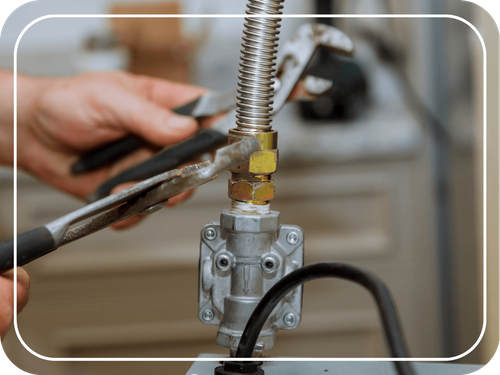Gas Line Repairs / Replacements
Gas Line Repairs/Replacement Services
At Advanced Repipe Specialist, we prioritize the safety and efficiency of your gas-fueled appliances. Serving the Bay Area, Sacramento, and surrounding cities, our experienced team is dedicated to providing reliable gas line repairs and replacements. Gas leaks can pose serious health and safety risks, so it’s essential to address any issues promptly.
Gas line repairs and replacements are essential for the safety and proper functioning of any gas-fueled appliance or system. Gas leaks can pose serious health and safety hazards, including the risk of explosion and carbon monoxide poisoning. In this article, we will discuss the importance of gas line repairs and replacements, signs of gas line problems, and the steps involved in repairing or replacing a gas line.
Get A Free Quote Bay Area: (408)609-4807 Sacramento (916)605-9572


Why Gas Line Repairs and Replacements are Important
Gas lines are responsible for delivering natural gas or propane to gas-fueled appliances, such as stoves, furnaces, and water heaters. Over time, gas lines can become damaged or deteriorated, which can lead to gas leaks and other hazards.
Gas leaks can pose serious health and safety hazards, including the risk of explosion and carbon monoxide poisoning. Gas leaks can also damage appliances and cause expensive repairs or replacements.

Signs of Gas Line Problems
There are several signs that may indicate a problem with your gas line, including:
The smell of gas: Natural gas and propane are odorless, but gas companies add a chemical called mercaptan to make it smell like rotten eggs. If you smell gas, it is important to evacuate the area immediately and contact a professional technician or a gas company.
Hissing sounds: If you hear a hissing sound near a gas appliance or gas line, it may indicate a gas leak.
Pilot light problems: If the pilot light on a gas appliance goes out frequently or burns with a yellow flame, it may indicate a problem with the gas line.
Higher gas bills: If your gas bills are higher than usual, it may indicate a gas leak or an inefficient appliance.
Steps Involved in Gas Line Repairs and Replacements
Gas line repairs and replacements should only be performed by a licensed and experienced professional. The steps involved in repairing or replacing a gas line may include:
Inspection: A professional technician will inspect the gas line to determine the extent of the damage or deterioration.
Shut off the gas supply: The gas supply to the affected area will be shut off to ensure safety.
Repairs or replacements: Depending on the extent of the damage, the technician may repair or replace the affected section of the gas line.
Testing: The technician will test the repaired or replaced gas line for leaks and ensure that it is functioning properly.
Final inspection: A final inspection may be required to ensure that the gas line repair or replacement meets all safety standards and regulations.
Gas line repairs and replacements are essential for the safety and proper functioning of any gas-fueled appliance or system. Signs of gas line problems include the smell of gas, hissing sounds, pilot light problems, and higher gas bills. If you suspect a gas leak or other gas line problem, it is important to contact a professional technician immediately to ensure the safety of your home or business.
Gas line repairs and replacements are essential for maintaining a safe environment in your home or business. If you notice any signs of gas line problems, contact Advanced Repipe Specialist immediately. With a dedicated team we are here to ensure your gas systems are safe and efficient.
Get A Free Quote Bay Area: (408)609-4807 Sacramento (916)605-9572
